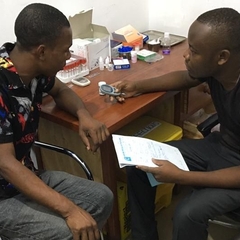
Visit to the Doctor is Unaffordable for most in Tanzania
10 Aug 2017, 11:47 a.m. in by Johnpeter Mwolo
Someone I met recently explained to me how hard it is for him to cover the costs for his diabetes appointments. As a result, he had to skip seeing the doctor. Unfortunately, because he skipped his appointment, he had to pay Tsh 20,000 ($9 USD). Things are much worse if you don’t have health insurance to help you cover the cost for medication and treatment.
Talking to him reminded me of what I experienced before I joined the university here. I used to travel from my hometown to Mwanza to see the doctor almost every month, but the transport fee alone cost almost Tsh 32,000 (approx. $14 USD). Not to mention, you have to eat and also find a guest house and pay for the room for one or two days. Adding together everything, it can cost up to Tsh 60,000 ($27 USD) for less than three days. Also, if you don’t have insurance you will have to add funds to buy insulin to your total spending, and the amount will keep going higher and higher. For a person who gets a minimum wage here, if you sum up everything and do not have insurance, you can be spending at least 40% of your income on diabetes each month. That was my experience before moving to the city to attend university.
I had a chance to talk to a few other diabetic people and traveling many kilometers in order to see the doctor is definitely a common struggle that many people face. This does not only happen here in Mwanza. People have to travel far from their home to see their doctors in many parts of Tanzania. For example, if you go to Dar es Salaam, the same thing happens to those who need to travel from other regions. Some people must come from very far to see the doctors at Muhimbili National Hospital in Dar es Salaam because there is no hospital near their home. It is similar near Kilimanjaro and Mbeya as well.
I once lived in Dodoma, the capital of Tanzania, where I went to register at the regional hospital as a diabetic so that I could be able to see the doctor. I only saw the nurse and she told me that people can only see the doctor if they have a specific problem. “If you’re ok,” she said “I can give you insulin and you should go back home.” I had to tell this to the chairperson of the national Diabetes Association in Tanzania so that the association could try to find a way for people with diabetes to see the doctor when they come such a long way to visit the hospital. I do not know if the situation is resolved or not but I will go there soon to see for myself.
In order for all these expenses to be reduced, it would be better if in regional hospitals there could be, at the very least, one trained doctor who understands diabetes that can administer a proper treatment accordingly. I understand that having a diabetes specialist is a challenge and there are not enough of those, but patients should not have to travel so far, especially if they do not even get to see a doctor.
I suggest that as part of the lessons they get from their universities during their studies, doctors should be given a short course about diabetes so as to be more competent. Then, patients with diabetes can get care from a more local doctor unless there are problems and then they can refer a person to a hospital where the specialists are available.
Many doctors graduate every year from our universities, and many more go for further studies every year, but almost none specialize in endocrinology. If the specialty in diabetes could be provided in our universities, we could have more doctors and nurses that understand and treat diabetes.
I ask from my heart that Tanzanian doctors consider a specialization in endocrinology. By doing this you will help save the life of a person like me and so many others. Diabetic patients are everywhere in Tanzania and they are desperately in need of you. That is why they travel miles away from home just to see a diabetes doctor every month. They have to hide some of their problems for the whole month just to come to the city in hopes that they can get help.
If we have more people learning about diabetes it can lead to more research being conducted in order to find a way to manage this condition in our own environment rather than reading what others are doing elsewhere. What we need more effort on how we can make this disease manageable here in Tanzania and Africa in general.
The expenses like transport fee, food, accommodation and medication will be reduced if - and only if - we get at least one trained medical doctor as a sub specialist in diabetes to see the patients locally on a monthly basis. This way, we can turn diabetes from being a death sentence to a treatable condition so that someone who is diagnosed with it can understand what he or she needs to do to live a full life.









